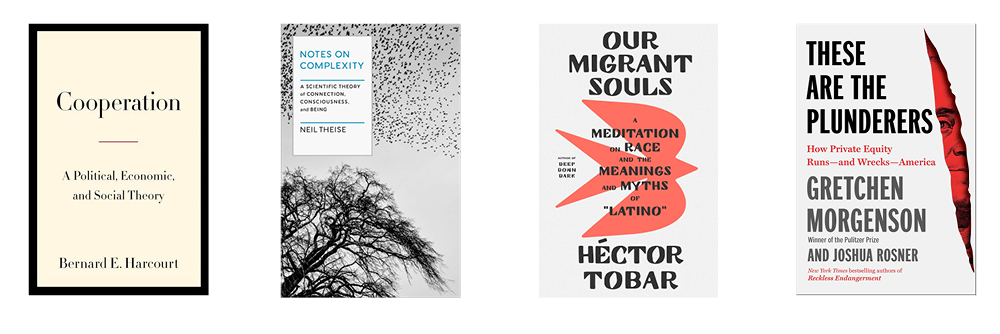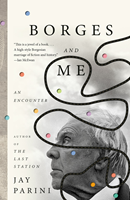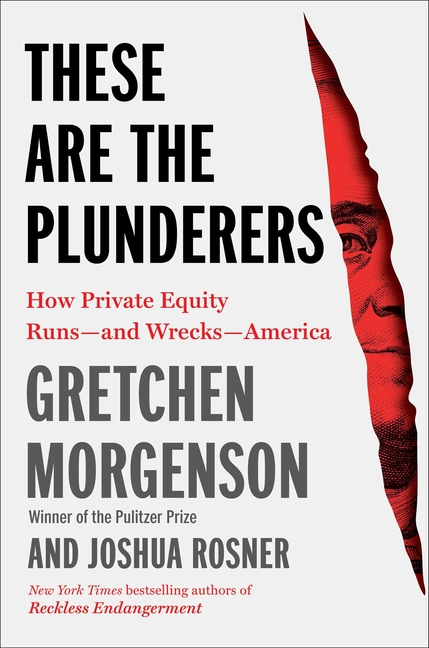New Releases | May 9, 2023
May 09, 2023
Excellent new books are brought into the world every single week. Here at Porchlight, we track them all and elevate four new releases we are excited about as they hit bookstore shelves on Tuesday morning.
The books are chosen by Porchlight's Managing Director, Sally Haldorson, and the marketing team: Dylan Schleicher, Gabbi Cisneros, and Jasmine Gonzalez. (Book descriptions are provided by the publisher unless otherwise noted.) This week, our choices are:

Jasmine’s pick: Cooperation: A Political, Economic, and Social Theory by Bernard E. Harcourt, Columbia University Press
Liberal democracy is in crisis around the world, unable to address pressing problems such as climate change. There is, however, another path—cooperation democracy. From consumer co-ops to credit unions, worker cooperatives to insurance mutuals, nonprofits to mutual aid, countless examples prove that people working together can extend the ideals of participatory democracy and sustainability into every aspect of their lives. These forms of cooperation do not depend on electoral politics. Instead, they harness the longstanding practices and values of cooperatives: self-determination, democratic participation, equity, solidarity, and respect for the environment.
Bernard E. Harcourt develops a transformative theory and practice that builds on worldwide models of successful cooperation. He identifies the most promising forms of cooperative initiatives and then distills their lessons into an integrated framework: Coöperism. This is a political theory grounded on recognition of our interdependence. It is an economic theory that can ensure equitable distribution of wealth. Finally, it is a social theory that replaces the punishment paradigm with a cooperation paradigm.
A creative work of normative critical theory, Cooperation provides a positive vision for addressing our most urgent challenges today. Harcourt shows that by drawing on the core values of cooperation and the power of people working together, a new world of cooperation democracy is within our grasp.
Sally’s pick: Notes on Complexity: A Scientific Theory of Connection, Consciousness, and Being by Neil Theise, Spiegel & Grau
Nothing in the universe is more complex than life. Throughout the skies, in oceans, and across lands, life is endlessly on the move. In its myriad forms—from cells to human beings, social structures, and ecosystems--life is open-ended, evolving, unpredictable, yet adaptive and self-sustaining. Complexity theory addresses the mysteries that animate science, philosophy, and metaphysics: how this teeming array of existence, from the infinitesimal to the infinite, is in fact a seamless living whole and what our place, as conscious beings, is within it. Physician, scientist, and philosopher Neil Theise makes accessible this “theory of being,” one of the pillars of modern science, and its holistic view of human existence. He notes the surprising underlying connections within a universe that is itself one vast complex system—between ant colonies and the growth of forests, cancer and economic bubbles, murmurations of starlings and crowds walking down the street.
The implications of complexity theory are profound, providing insight into everything from the permeable boundaries of our bodies to the nature of consciousness. Notes on Complexity is an invitation to trade our limited, individualistic view for the expansive perspective of a universe that is dynamic, cohesive, and alive—a whole greater than the sum of its parts. Theise takes us to the exhilarating frontiers of human knowledge and in the process restores wonder and meaning to our experience of the everyday.
Gabbi’s pick: Our Migrant Souls: A Meditation on Race and the Meanings and Myths of “Latino” by Héctor Tobar, MCD
"Latino" is the most open-ended and loosely defined of the major race categories in the United States. Our Migrant Souls: A Meditation on Race and the Meanings and Myths of "Latino" assembles the Pulitzer Prize winner Héctor Tobar's personal experiences as the son of Guatemalan immigrants and the stories told to him by his Latinx students to offer a spirited rebuke to racist ideas about Latino people. Our Migrant Souls decodes the meaning of "Latino" as a racial and ethnic identity in the modern United States, and seeks to give voice to the angst and anger of young Latino people who have seen latinidad transformed into hateful tropes about "illegals" and have faced insults, harassment, and division based on white insecurities and economic exploitation.
Investigating topics that include the US-Mexico border "wall," Frida Kahlo, urban segregation, gangs, queer Latino utopias, and the emergence of the cartel genre in TV and film, Tobar journeys across the country to expose something truer about the meaning of "Latino" in the twenty-first century.
Dylan’s pick: These Are the Plunderers: How Private Equity Runs—and Wrecks—America by Gretchen Morgenson and Joshua Rosner, Simon & Schuster
Much has been written about the widening gulf between rich and poor, the pernicious effects our deepening income inequality has on the US’s well-being, and how our style of capitalism has failed to provide a living wage for so many Americans. But nothing has fully detailed the crucial role a small cohort of elite financiers has played in this dispiriting outcome over the past thirty years. Pulitzer Prize–winning journalist and bestselling author Gretchen Morgenson, with coauthor Joshua Rosner, unmask the small group of celebrated Wall Street financiers, and their government enablers, who use excessive debt and dubious practices to undermine our nation’s economy for their own enrichment: private equity.
These are the Plunderers lucidly and maddeningly traces the thirty-year history of corporate takeovers in America and private equity’s increasing dominance. Morgenson and Rosner investigate some of the biggest names in private equity, exposing how they buy companies, load them with debt, and then bleed them of assets and profits. All while prosecutors and regulators stand idle.
Morgenson and Rosner show how companies absorbed by private equity have worse outcomes for everyone but the financiers: employees are more likely to lose their jobs or their benefits; companies are more likely to go bankrupt; patients are more likely to have higher healthcare costs; residents of nursing homes are more likely to die; towns struggle when private equity buys the main businesses, crippling the local economy; and school teachers, firefighters, medical technicians, and other public workers are more likely to have lower returns on their pensions because of the fees private equity extracts from their investments. In other words: we are all worse off because of private equity.
These are the Plunderers exposes the greed and pillaging in private equity, revealing the many ways these billionaires have bled our economy, and, in turn, us.
WHAT WE'VE BEEN READING AT HOME
 "Currently loving this book Borges and Me by Jay Parini. It's about an early-20-something American grad student studying poetry and hanging out with Alastair Reid in Scotland, when they are visited by Borges for a few weeks. The grad student has to drive Borges around the highlands and they just kinda chat and hang out. It's hilarious and amazing."
"Currently loving this book Borges and Me by Jay Parini. It's about an early-20-something American grad student studying poetry and hanging out with Alastair Reid in Scotland, when they are visited by Borges for a few weeks. The grad student has to drive Borges around the highlands and they just kinda chat and hang out. It's hilarious and amazing."
—Michael Jantz, Logistics Director






